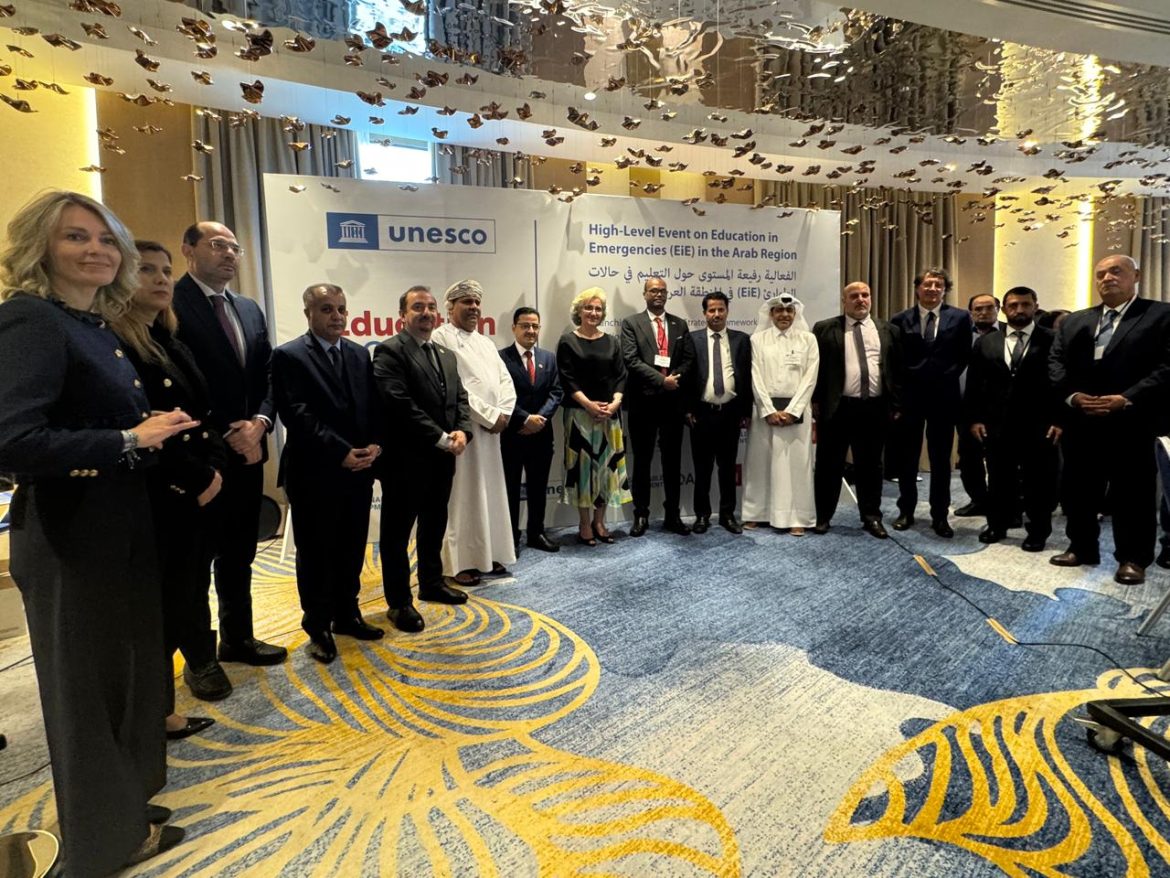Beirut, Lebanon | 12–13 November 2025
In a region increasingly affected by conflict, displacement, and climate-related disasters, UNESCO launched the Strategic Framework for Education in Emergencies in the Arab Region (2025–2030) during a High-Level Regional Event in Beirut, bringing together Ministers of Education, senior government officials, and key partners to coordinate action and safeguard the right to education for millions of children and youth.
Ministers and senior officials from across the Arab region, together with development partners, UN agencies, international organizations, civil society, academia, and youth leaders, reaffirmed their collective commitment to ensuring the right to education and strengthening regional cooperation.
“When education stops, everything stops safety, protection, hope, stability, and the very foundations of peace. Yet, education remains the least funded sector in humanitarian response. In 2023, global humanitarian financing for education declined for the first time in a decade. We cannot build peace, stability, or sustainable development if millions of learners are left behind, especially in the moments they need education the most. This is why UNESCO is launching this Strategic Framework today. It directly responds to the commitments we made together at the Transforming Education Summit, the Fortaleza Declaration at GEM 2024, and UNESCO’s global frameworks on migration, displacement, emergencies, and education,” said Paolo Fontani, Director of UNESCO Regional Office in Beirut and Representative to the Syrian Arab Republic and Lebanon.
“It also responds to the specific needs and realities of the Arab region, shaped by protracted crises, large-scale mobility, and the urgent call for resilient and inclusive education systems,” Fontani added.
Through a detailed presentation of the new Strategic Framework, UNESCO outlined a common vision and programmatic direction to help countries build resilient, inclusive, and crisis-prepared education systems. The Framework aims to ensure that all learners, including the most vulnerable, can access safe and quality education during emergencies and protracted crises. It also seeks to connect humanitarian response with long-term development planning, promoting recovery, peacebuilding, and social cohesion across the region.
Over two days, participants took part in ministerial dialogues, youth-led discussions, and high-level expert panels, examining national leadership in crisis education and the financing of resilient education systems. The thematic sessions addressed crisis-sensitive planning and the development of youth skills for recovery, highlighting that education is not only a fundamental right but also a lifeline that offers stability, protection, and hope in times of conflict and uncertainty.
On the evening of the first day, under the patronage of the Minister of Education and Higher Education, H.E. Dr. Rima Karami, a concert by Beirut Chants El Sistema was held at the Lebanese American University (LAU), showcasing the power of music in education and recovery. The performance
underscored the vital role of arts in promoting mental health and psychosocial support a key component of the Education in Emergencies program, supported by the Government Japan.
The event concluded with a collective call for stronger regional collaboration, sustainable financing, and integrated policy responses to ensure that education remains uninterrupted in the face of crises. Participants reaffirmed that investing in education in emergencies is an investment in peace, recovery, and the future of the region.
The launch of the Strategic Framework reinforces UNESCO’s ongoing commitment to support Arab Member States in advancing Sustainable Development Goal 4 (SDG4), which seeks to ensure inclusive and equitable quality education and promote lifelong learning opportunities for all.
UNESCO launches the Strategic Framework on Education in Emergencies in the Arab Region (2025-2030) at High-Level Event in Beirut
95

